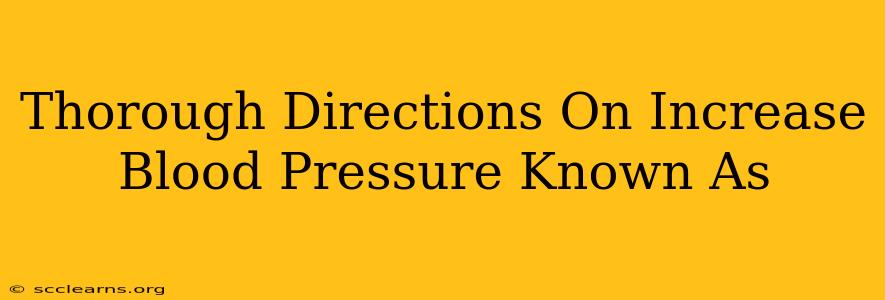Understanding and managing hypertension, or high blood pressure, is crucial for maintaining overall health. While lowering blood pressure is often the focus, there are situations where a doctor might need to help increase blood pressure, particularly in cases of hypotension (low blood pressure). This article will explore potential causes of low blood pressure and how medical professionals might address it, emphasizing that this information should not be interpreted as self-treatment advice. Always consult your physician before making any changes to your medication or treatment plan.
Understanding Hypotension (Low Blood Pressure)
Hypotension is defined as abnormally low blood pressure. While some individuals experience low blood pressure without any significant symptoms, others might face dizziness, fainting, and other concerning side effects. Several factors contribute to hypotension, including:
- Dehydration: Insufficient fluid intake leads to decreased blood volume, resulting in lower blood pressure.
- Medication side effects: Certain medications, such as diuretics (water pills) and some blood pressure medications, can lower blood pressure as a side effect.
- Heart conditions: Conditions affecting the heart's ability to pump effectively can cause hypotension.
- Endocrine disorders: Problems with the adrenal glands or thyroid can disrupt blood pressure regulation.
- Nutritional deficiencies: Deficiencies in certain vitamins and minerals can impair blood pressure control.
- Severe infections: Sepsis, a life-threatening condition, can lead to dangerously low blood pressure (septic shock).
- Blood loss: Significant blood loss from trauma or internal bleeding can cause hypotension.
- Nervous system disorders: Conditions affecting the autonomic nervous system can disrupt blood pressure regulation.
Medical Approaches to Increasing Blood Pressure
Increasing blood pressure is not something to be undertaken lightly. It should only be done under the strict supervision of a medical professional. Doctors might employ several approaches depending on the underlying cause and severity of the hypotension:
1. Lifestyle Modifications:
- Increased fluid intake: Adequate hydration is essential for maintaining blood volume.
- Dietary changes: A diet rich in sodium (under medical supervision) and electrolytes might be recommended. However, excessive sodium is generally harmful, so this should only be done with a doctor’s guidance.
- Increased salt intake (with caution): In some cases, a doctor might advise a slight increase in salt intake, but this must be carefully monitored as excessive salt can exacerbate other health problems.
- Regular exercise (with caution): Gentle exercise can help improve circulation and cardiovascular health. However, strenuous exercise could worsen hypotension in some cases.
2. Medication:
A doctor might prescribe medications to increase blood pressure. This might include:
- Fludrocortisone: This medication helps the body retain sodium and water, increasing blood volume and subsequently blood pressure.
- Midodrine: This medication constricts blood vessels, increasing blood pressure.
- Epinephrine (adrenaline): In cases of severe hypotension (like shock), epinephrine might be administered intravenously.
3. Addressing Underlying Conditions:
The most effective way to address hypotension is to treat the underlying medical condition causing it. This might involve addressing heart conditions, endocrine disorders, or nutritional deficiencies.
Important Considerations:
- Self-treatment is dangerous: Never attempt to increase your blood pressure without consulting a doctor.
- Regular monitoring: If you experience low blood pressure, regular monitoring is crucial to track its progression and assess the effectiveness of treatment.
- Follow medical advice: Strictly adhere to your doctor's recommendations regarding medication, lifestyle modifications, and follow-up appointments.
This information is intended for educational purposes only and should not be considered medical advice. Always consult with your physician or other qualified healthcare professional before making any decisions related to your health or treatment. They can properly diagnose the cause of your low blood pressure and recommend the appropriate course of action.

